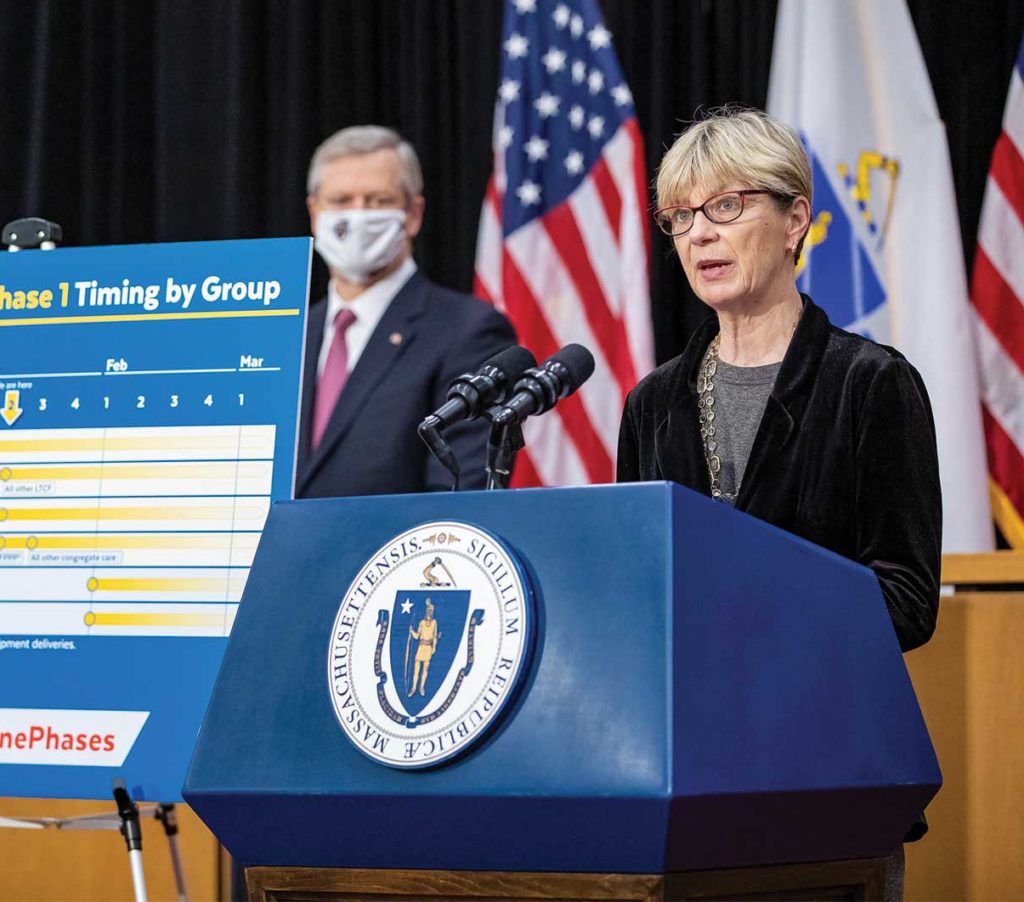
Elders living in public and private subsidized housing have been moved up in priority in Phase 2 of the state’s COVID-19 vaccination plan, expected to begin in February.
During a State House press conference last week, Secretary of Health and Human Services Marylou Sudders made the announcement while discussing a plan to vaccinate those in congregate settings.
“In order to further protect vulnerable populations and ensure equitable distribution of the COVID-19 vaccine, today we’re announcing an addition to priority groups included in Phase 2, and that is public and private low-income and affordable senior housing,” Sudders said.
The change means that inoculation of residents and staff of public and private low-income and affordable senior housing should start in February.
Sudders went on to say that Phase 2 Group 1 priority, to which this group now belongs, also includes anyone who is 75 or older or has two or more comorbidities, certain medical conditions such as heart disease, cancer or diabetes that may increase the risk of severe illness from COVID-19.
Gov. Charlie Baker said congregate care sites such as shelters are next in line to receive vaccines in the current phase, “because they serve vulnerable populations in densely populated settings, which means they’re at significant risk for contracting COVID-19.”
More than 94,000 individuals living and working in congregant care sites are eligible for vaccination.
So far during Phase 1, the state has administered more than 239,000 doses at about 100 vaccination sites.
“Distributing vaccines to our residents can’t happen fast enough, and we’ve made enough progress with our front-line health care workers and long-term care residents that we’re ready to start inoculating the next group of residents,” Baker said.
Those living and working in congregant care settings, including shelter programs, domestic violence shelters, veterans shelters and approved private special education schools, started getting vaccinated on Monday. Correctional facilities are on a separate three-week track.
Sudders said senior facilities that are part of the HUD Section 202 Supportive Housing for the Elderly program are already inoculating their residents.
By prioritizing seniors in public and private low-income subsidized housing, Sudders said approximately 160,000 residents and staff will be eligible for vaccination. That list includes those living in public housing properties that are designated primarily for older adults.
“This includes those public housing properties owned by a local public housing authority but managed by a private company,” Sudders added.
Department of Housing and Community Development, MassHousing and HUD-supported privately owned properties designated for older adults earning less than 80 percent of area median income are also on the list, Sudders said.
Diane Gould, president and CEO of Framingham-based Advocates Inc., said this will allow more than 1,100 residents and staff at all 13 of her organization’s locations to be vaccinated.
Advocates Inc. runs group homes and support services for those living with autism and dealing with addiction recovery. It also serves deaf people suffering from mental and psychiatric health issues and people with brain injuries.
2Life Communities President and CEO Amy Schectman said she applauds the Baker administration for prioritizing senior subsidized housing. The Brighton-based nonprofit runs five campuses for seniors wanting to age in place.
Both Advocates and 2Life Communities and will administer vaccines through the federal pharmacy partnership program, meaning CVS and Walgreens will be inoculating residents and staff.
“For older adults living in subsidized housing,” Schectman said, “they face a double threat from COVID: By virtue of their age [they’re] more vulnerable to serious illness and death from the disease, and also more at risk for the dire consequences of social isolation.”
Schectman added that it is “a really important milestone” to prioritize this population for vaccination.
Residents and staff at the 2Life Communities Shillman House in Framingham have already been vaccinated as part of a pilot program.
“[F]or the people who’ve been so desperately waiting for the face-to-face connections, it means everything,” Schectman said at the State House event. “Thank you for giving us these vaccines so quickly. I promise it’s making a huge difference.”






